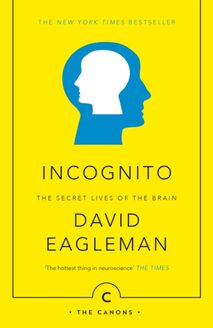-
 Univers
Univers
-
 Ebooks
Ebooks
-
 Livres audio
Livres audio
-
 Presse
Presse
-
 Podcasts
Podcasts
-
 BD
BD
-
 Documents
Documents
-
- Cours
- Révisions
- Ressources pédagogiques
- Sciences de l’éducation
- Manuels scolaires
- Langues
- Travaux de classe
- Annales de BEP
- Etudes supérieures
- Maternelle et primaire
- Fiches de lecture
- Orientation scolaire
- Méthodologie
- Corrigés de devoir
- Annales d’examens et concours
- Annales du bac
- Annales du brevet
- Rapports de stage
La lecture à portée de main
Vous pourrez modifier la taille du texte de cet ouvrage
Découvre YouScribe en t'inscrivant gratuitement
Je m'inscrisDécouvre YouScribe en t'inscrivant gratuitement
Je m'inscrisEn savoir plus
Vous pourrez modifier la taille du texte de cet ouvrage
En savoir plus

Description
Informations
| Publié par | Canongate Books |
| Date de parution | 14 juin 2012 |
| Nombre de lectures | 1 |
| EAN13 | 9781847677570 |
| Langue | English |
Informations légales : prix de location à la page 0,0400€. Cette information est donnée uniquement à titre indicatif conformément à la législation en vigueur.
Extrait
About the Author
Dino Buzzati was born in Italy in 1906. After receiving a law degree from the University of Milan, he worked as a reporter and later as special correspondent and editor for the Corriere della Sera/ His literary career began in 1933 with the publication of Barnabas of the Mountains and The Secret of the Old Forest ; however, it was not until he wrote The Tartar Steppe in 1940 and The Seven Messengers in 1942 that he received proper recognition in the mainstream of contemporary European literature. His works have been translated into many languages. Buzzati died in Milan in 1972.
Tim Parks is the author of Destiny, Europa, Adultery and Other Diversions, An Italian Education and other works of fiction and nonfiction. He lives in Verona, Italy.
First published in Italy under the title Il Deserto dei Tartari Copyright © 1945, Arnoldo Mondadori Editore, s.p.a, Milano
English translation first published in Great Britain in 1952, by Secker & Warburg
Introduction first published by Penguin Books, 2000
This edition first published in 2007 by Canongate Books Ltd, 14 High Street, Edinburgh, EH1 1TE
This digital edition first published in 2012 by Canongate Books
Copyright © Dino Buzzati, 1945 English translation copyright © Stuart C. Hood, 1952 Introduction copyright © Tim Parks, 2000
The moral right of Dino Buzzati and Stuart C. Hood to be identified as respectively the author and translator of the work has been asserted in accordance with the Copyright, Designs and Patents Act 1988
The publisher gratefully acknowledges subsidy from the Scottish Arts Council towards the publication of this volume
British Library Cataloguing-in-Publication Data A catalogue record for this book is available on request from the British Library
ISBN 978 1 84767 757 0
canongate.co.uk
Contents
About the Author Title Page Copyright Introduction: Throwing Down A Gauntlet Chapter One Chapter Two Chapter Three Chapter Four Chapter Five Chapter Six Chapter Seven Chapter Eight Chapter Nine Chapter Ten Chapter Eleven Chapter Twelve Chapter Thirteen Chapter Fourteen Chapter Fifteen Chapter Sixteen Chapter Seventeen Chapter Eighteen Chapter Nineteen Chapter Twenty Chapter Twenty-One Chapter Twenty-Two Chapter Twenty-Three Chapter Twenty-Four Chapter Twenty-Five Chapter Twenty-Six Chapter Twenty-Seven Chapter Twenty-Eight Chapter Twenty-Nine Chapter Thirty
Introduction THROWING DOWN A GAUNTLET Tim Parks
‘Now a book lives’, wrote D.H. Lawrence, ‘as long as it is unfathomed. Once it is fathomed, once it is known and its meaning is fixed or established, it is dead’. He uses the remark to launch an attack on allegory, indeed on all stories that offer a neat equivalence between their characters or settings and abstract qualities. ‘A man is more than a Christian,’ he protests, ‘a rider on a white horse must be more than mere faithfulness and truth.’
Written in 1938, The Tartar Steppe is the story of a young officer dispatched to do service in a remote mountain garrison overlooking a vast northern desert. At first desperate to escape and return to the pleasures of normal life, he nevertheless falls under the spell of the place to the point that he will spend the next thirty years there, sustained only by the vain hope that one day an enemy attack will offer a moment of glory and fulfilment. Buzzati remarked: ‘The idea of the novel came out of the monotonous night-shift I was working at Corriere della Sera in those days. It often occurred to me that that routine would never end and so would eat up my whole life quite pointlessly. It’s a common enough feeling, I think, for most people, especially when you find yourself slotted into the time-tabled existence of a big town. Transposing that experience into a fantastical military world was an almost instinctive decision."
Is the book, then, a mere allegory of equivalences? Buzzati had originally called his story The Fort and the title was only changed on the insistence of the publishers, who were eager to avoid allusions to the sensitive military situation in Europe. One Italian critic remarks: ‘The "desert" of the novel is thus the story of life in the "fort" of the newspaper which promises the wonders of a solitude that is both habit and vocation.’ You can already hear Lawrence muttering, ‘fathomed and dead!’
But if it’s a commonplace that something explained is very largely explained away, it is also true that faced with any phenomenon the mind instinctively sets out to construct an explanation. Here is an irony Lawrence doesn’t follow up. Confronted with a story, any story, we immediately seek to fathom it out, to know it, even though we realize that if we succeed it will no longer be interesting, it will die. Oddly, then, the greatest pleasure we can get from a story only comes when the smaller satisfaction of having explained it away is thwarted. The mind discards, as it were, the chaff of the explicable to find real repose, or real excitement, in a kernel of enigma.
The Tartar Steppe is one of those precious novels that take the enormous risk of throwing down a gauntlet to the reasoning mind. Explain me if you can or dare, it says. Fathom me out. Provocative and frightening as the book is, we feel we must accept this challenge, put this disturbing story behind us. Who is this man who tosses away his life for a chimera, why does he seem so recognisable? Fortunately, the extraordinary clarity of the narrative, its elegant structure and straightforward execution, persuade us that it is that manner of thing for which explanation is surely available, a puzzle we can solve. Yet in the end, twisting and turning this way and that, mocking and infinitely ironic, Buzzati’s story somehow denies us what we always felt was within our grasp. No, on putting the book down we cannot honestly say that we know what it meant. Quite the contrary. In this way it succeeds in evoking in its reader the central experience of its main character: in every sense life, not only his own but the whole of life, eludes his grasp.
One September morning, Giovanni Drogo, being newly commissioned, set out from the city for Fort Bastiani; it was his first posting.
And his last … There is a ruthless dispatch to these opening lines which is typical of the way Buzzati works. Already he knows exactly what he is doing. In a way the whole novel will be written on the first page. Given no details of his past life, no sense of geographical or cultural location, Drogo is immediately and inevitably Everyman. He has waited for this day, this departure, the beginning of his ‘real life’, ‘for years’, but looking in the mirror now he doesn’t ‘find there the expected joy.’ His early youth is gone, tediously consumed in books and study, but fortunately adulthood promises new satisfactions, new hopes. For the next two hundred pages, Buzzati will show us how resourcefully and how cruelly such hopes will ever sprout from the interminable erosion of Drogo’s wasted days, their punctual disappointments. The wonder is that a writer should display such merciless control in elaborating a scenario of frustration and impotence.
Far from resembling the editing room of a big city newspaper, Fort Bastiani is located on the highest and most inaccessible of mountain terrains. This is Buzzati’s masterstroke, the decision that more than any other will give the book its rich elusiveness. How can we not think of a medieval knight embarking on a spiritual quest as we watch Drogo urge his horse up winding paths beneath rock face and waterfall, lie down for the night wrapped in his cloak, emerge the following morning at an altitude immeasurably higher than anything he expected, onto a narrow plateau where the yellow walls of the fort rise in the cleft between towering peaks? The scene is set for some apocalyptic trial. We are anxious that our hero perform well.
But no trial presents itself, or at least none of the variety we expect. Drogo is not going to war. Nor is there a grail to recover. He will never meet the enemy, let alone be given a chance to slay an ogre or a giant. Only in routine regimental rituals will his sabre be bared, only at the endless changing of a meaningless guard will the stirring trumpet sound. This is a story of drama deferred, catharsis denied. To compensate, there are the mountains.
It’s important here to say a word on what the mountains meant for Buzzati, and indeed on the place they occupy in the collective imagination of Italy in general, northern Italy in particular. Brought up in Belluno at the confluence of the Ardo and Piave rivers immediately below the majestic Dolomites, Buzzati was ten years old when Italy joined the First World War and became involved in the one military campaign of modern times that Italians will still refer to as glorious. Defending a line that ran across the very peaks of the Alps from the Swiss border to the Adriatic, the Italian troops hacked trenches in stone and snow, lived in caves and igloos at frightening altitudes, attacked machine-guns in terrain where the only grave was a heap of shards. Finally routed at Caporetto in the east with the loss of half a million men, they nevertheless fought a desperate rearguard action to hold a line behind the Piave, a river north of Venice, whence the tide was eventually turned and the enemy chased north again. For an Italian, the northern mountains are the locus par excellence of military glory.
And so much more than that, of course. In his early teens Buzzati began to climb in the Dolomites. It would be a lifelong passion. A competent artist, he drew and painted the mountains. He never tired of it. His first literary effort, at fourteen, was called La canzone delle montagne (The Song of the Mountains). In his first novel, Barnabus of the Mountains , the Dolomites were already assuming a role at least as important as that of the

Ebooks
Chronicle In Stone
Ismail Kadaré


Ebooks
Incognito
David Eagleman


Ebooks
Ocean Sea
Alessandro Baricco


Ebooks
Fortunate Man
John Berger


Ebooks
Teaching a Stone to Talk
Annie Dillard


Ebooks
Neither Wolf Nor Dog
Kent Nerburn


Ebooks
Close to the Knives
David Wojnarowicz


Ebooks
Philadelphia Fire
Edgar Wideman John


Ebooks
L.A. Woman
Eve Babitz


Ebooks
Edge of the Sea
Rachel Carson


Ebooks
Under the Sea-Wind
Rachel Carson


Ebooks
Pattern in the Carpet
Margaret Drabble


Ebooks
Reconciliation
Naoya Shiga


Ebooks
Dante's Divine Trilogy
Alasdair Gray


Ebooks
Summer Bird-Cage
Margaret Drabble

-
 Univers
Univers
-
 Ebooks
Ebooks
-
 Livres audio
Livres audio
-
 Presse
Presse
-
 Podcasts
Podcasts
-
 BD
BD
-
 Documents
Documents
-
Jeunesse
-
Littérature
-
Ressources professionnelles
-
Santé et bien-être
-
Savoirs
-
Education
-
Loisirs et hobbies
-
Art, musique et cinéma
-
Actualité et débat de société
-
Jeunesse
-
Littérature
-
Ressources professionnelles
-
Santé et bien-être
-
Savoirs
-
Education
-
Loisirs et hobbies
-
Art, musique et cinéma
-
Actualité et débat de société
-
Actualités
-
Lifestyle
-
Presse jeunesse
-
Presse professionnelle
-
Pratique
-
Presse sportive
-
Presse internationale
-
Culture & Médias
-
Action et Aventures
-
Science-fiction et Fantasy
-
Société
-
Jeunesse
-
Littérature
-
Ressources professionnelles
-
Santé et bien-être
-
Savoirs
-
Education
-
Loisirs et hobbies
-
Art, musique et cinéma
-
Actualité et débat de société
- Cours
- Révisions
- Ressources pédagogiques
- Sciences de l’éducation
- Manuels scolaires
- Langues
- Travaux de classe
- Annales de BEP
- Etudes supérieures
- Maternelle et primaire
- Fiches de lecture
- Orientation scolaire
- Méthodologie
- Corrigés de devoir
- Annales d’examens et concours
- Annales du bac
- Annales du brevet
- Rapports de stage





